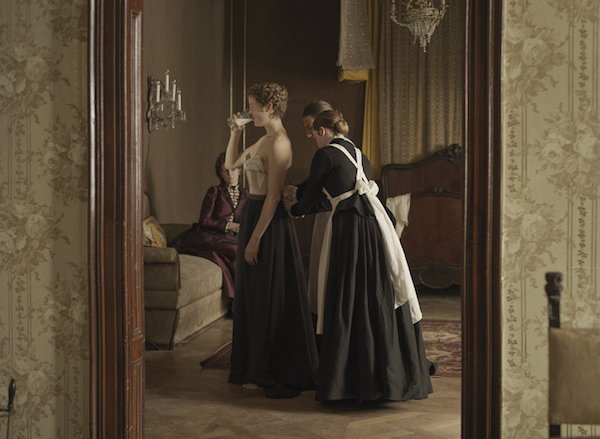Movie review by Greg Carlson
Marie Kreutzer’s “Corsage” reinterprets the historical biography of Empress Elisabeth of Austria, the Bavarian royal assassinated in 1898. Popularly known as Sisi or Sissi, she married Emperor Franz Joseph I when she was 16 and has attracted ongoing attention in multiple theater, film and television productions over the years, including fiction and nonfiction, animation, operetta, and ballet. This past September, Netflix released the six-episode series “The Empress.” Ernst Marischka’s 1950s movie trilogy helped launch Romy Schneider to stardom and has been a longtime Christmas viewing staple regularly broadcast on German and Austrian television. Ava Gardner tried on her jewels in “Mayerling.” In Kreutzer’s movie, Vicky Krieps portrays the curious subject.
Unafraid to court controversy, Kreutzer stages a radical alternative to the recorded events surrounding Elisabeth’s life and death. Like any number of the filmmaker’s other choices, the movie’s climax suggests a cocky insouciance regarding careful fidelity to the “real.” This disregard for the traditional rules of the biopic will enrage some historians but delight fans of material like Sofia Coppola’s “Marie Antoinette” and Pablo Larrain’s “Spencer.” Despite the overt parallels, Kreutzer has bristled at the frequent comparisons to the former, insisting that she does not like Coppola’s film.
The anachronistic placement of a harp-accompanied performance of “As Tears Go By” and other diegetic music picks – not to mention additional modern touches – align as closely to “Marie Antoinette” as the themes of a woman constrained by the regulations of the patriarchy. The spheres over which Elisabeth exercised any substantive control paled next to the formal obligations and expectations of her station. Like Diana, Kreutzer’s heroine suffers the whims of a faithless spouse. In one great scene, Elisabeth tracks down the object of her husband’s extramarital attention to encourage an affair.
Krieps, who brought the idea of an Elisabeth movie to an initially skeptical Kreutzer, makes for a compelling rebel. Whether holding her breath under water, cavorting for the motion picture camera of Louis Le Prince, sparring with her grown son or her young daughter, squeezing into a tightly-laced corset, or limiting her dinner to a slice or two of orange, the actor brings her character to vivid and vital life. Krieps fires up her sophisticated interpretation with all kinds of quirky tics and mannerisms that increase our curiosity. When she bursts out laughing at socially inappropriate moments, we sense that she’s struck by the incomprehensible madness of her circumstances.
As Kreutzer thumbs her nose, or, more accurately, gives the finger to the history books, it becomes evident that the director’s preoccupation with Elisabeth “coming apart” at the age of 40 is the key component of “Corsage” that transcends time to become a commentary on any era. Frustrations and anxieties threaten to erupt each time Elisabeth is silenced by her perpetually imperious husband. Kreutzer and Krieps leave the viewer to guess at the protagonist’s motivation for raging against her confinement by fencing, horseback riding, and flirting with the possibility of adulterous liaisons of her own. Elisabeth could be driven by forces both internal and external. Either way, she will faint and she will feint.
